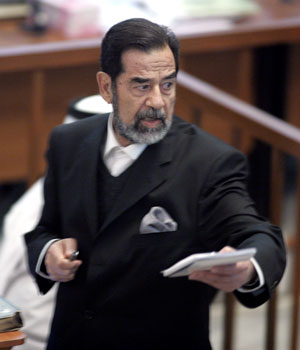
Former Iraqi President Saddam Hussein testifies during his trial on genocide charges at the fortified Green Zone in Baghdad, 14 September 2006 (AFP)
BAGHDAD, Iraq (AP) – The chief judge in Saddam Hussein’s genocide trial told the ex-president that “you were not a dictator,” sparking Kurdish demands he be replaced. The judge already had rejected prosecution demands he step down for allegedly favoring the defense.
Judge Abdullah al-Amiri, a Shiite Arab, made the comment Thursday after Saddam, a Sunni, challenged testimony by a Kurdish farmer who said the ousted president ordered him to “shut up” when he begged for the release of nine missing relatives.
“Why did he try to see Saddam Hussein (if) Saddam Hussein was a dictator and was against the Kurdish people?” the former president asked.
The judge replied: “You are not a dictator. You were not a dictator. However, the people or the individuals and officials surrounding you created a dictator (out of you). It was not you in particular. It happens all over the world.” “Thank you,” Saddam responded, bowing his head in respect.
Saddam and six co-defendants are being tried on charges of committing atrocities against Kurds during the Operation Anfal crackdown in northern Iraq nearly two decades ago.
The prosecution alleges some 180,000 people died in the campaign, many of them killed by poison gas.
Two hours after the comment about Saddam, al-Amiri abruptly recessed the session until Monday for what he called “technical reasons.”
Al-Amiri’s comments are likely to stoke anger among Kurds who had already complained he was too lenient with Saddam. On Wednesday, the veteran judge rejected prosecution demands that he step aside after allowing Saddam to lash out at Kurdish witnesses the day before.
“The judge is weak and isn’t doing his duty,” Kurdish elder statesman Mahmoud Othman told The Associated Press. “We as Kurdish politicians ask for a change in judges, and he must be replaced. … There are 182,000 victims of Anfal, and this judge’s manner could affect the verdict.”
But al-Amiri’s fellow Shiites in the Iraqi High Tribunal rallied to his defense, saying the comment was unlikely to influence the verdict. A five-judge panel, including al-Amiri, is hearing the case, and the verdict will be determined by a majority vote among the members.
“The word ‘dictator’ was a slip of the tongue by the judge,” court spokesman Raid Juhi said. “The court can’t characterize defendants and should stick to legal terms. The man has been a judge for 25 years, but he got the expression wrong.”
Senior prosecutor Jaafar al-Moussawi agreed the comments were inappropriate, but said that “in my view the Kurdish street and the Iraqi people understand what’s going on in this court and that it will implement justice.”
Al-Amiri’s style in the Anfal trial has been markedly different from that of the chief judge in the other case against Saddam, the killing of 148 Shiites following a 1982 assassination attempt against the leader in the town of Dujail.
The Kurdish judge in the Dujail case, Raouf Abdul-Rahman, threw out defendants and defense lawyers when he ruled they were out of order, prompting defense demands that he step down.
Abdul-Rahman took over the Dujail case about halfway through when his predecessor as chief judge, also a Kurd, stepped down, complaining about Shiite criticism that he was too soft on Saddam.
A verdict in that case is expected Oct. 16. The charges in both trials carry a maximum sentence of death.
Al-Amiri, in his mid-50s, has served as a judge for 25 years. But unlike many judges during Saddam’s rule, he was not a member of the ruling Baath Party, a fellow judge on the Saddam tribunal said, speaking on condition of anonymity because he was not authorized to talk to the press.
Al-Amiri worked as an investigative judge, then a prosecuting judge in a Baghdad criminal court, the colleague said. Some members of such nonpolitical courts were not required to be Baath members.
During the testimony leading up to the dictator comment, farmer Abdullah Mohammed Hussein said he had been allowed to meet with Saddam after appealing to local authorities in his village.
“I told Saddam, ‘Sir, my family members were arrested,”‘ Hussein recalled, speaking in Kurdish through an Arabic translator. “Saddam asked me where, and I told him, ‘In my village.’ Saddam said: ‘Shut up. Your family is gone in the Anfal.”‘
Hussein, who is not related to the former president, said he saluted Saddam and left. He said that only two years ago, local authorities in his village told him they found the remains of three of his relatives in a mass grave. He said the whereabouts of the rest of them is unknown.
One of Saddam’s lawyers asked the court to strike the testimony from the record, arguing it was “inaccurate.” He accused the witness of telling investigators earlier that he was part of a Kurdish militia but then testifying before the court he was not.
Saddam has insisted the crackdown was directed at Kurdish guerrillas who rebelled against the government during Iraq’s 1980-88 war with Iran. He has accused Kurdish witnesses of trying to sow ethnic division by alleging chemical attacks and mass arrests during the offensive.
Another witness, Ali Mahmoud, 51, identified himself as having been a Kurdish guerrilla fighter, eliciting a “thank you” from Saddam.
Mahmoud said he lost his sister and her daughter in the Anfal offensive and their bodies were found only three years ago. He said he was wounded in the hip while fighting Iraqi troops.

An Iraqi soldier stands on guard in an empty road during a four-hour vehicle curfew for Friday prayers in Baghdad, September 15 2006 (REUTERS)

Chief judge Abdullah al-Amiri addresses the court during the trial of former Iraqi President Saddam Hussein at the fortified Green Zone in Baghdad, Iraq, Sept. 14, 2006. (AP)
